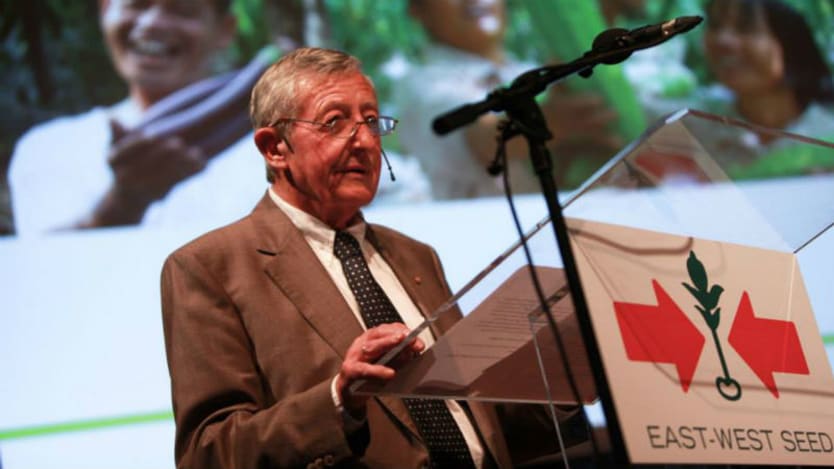
NEW YORK — Simon Groot, a sixth-generation seedsman, is guided by a simple mantra: You serve the farmers first. Groot, 85, knows that supplying farmers with high-quality seeds and proper training is key for boosting agricultural development, regarded as one of the most powerful ways to end extreme poverty.
“People there have little money and lousy seeds. That is not a good combination.”
— Simon Groot, founder, East-West SeedIn 1981, Groot, a native of the Netherlands, went on an exploratory tour of the Philippines to assess new opportunities in the seed industry. He discovered poor quality seeds and crop yields. His solution? Bring technological innovations in seeds from the Netherlands to Southeast Asia, where he went on to supply and create the region’s first commercial market for locally developed vegetable hybrid seeds.
Groot’s company East-West Seed now supplies over 20 million smallholder farmers in 60 countries across Africa, Asia, and Latin America each year with 973 improved varieties of 60 vegetable crops, which people can purchase as $1 value packs. East-West Seed also trains about 50,000 farmers each year.
And today, the World Food Prize announced Groot as its 2019 laureate — and winner of a $250,000 prize — at a ceremony at the U.S. Department of State in Washington, D.C.
Groot spoke with Devex last week about the importance of investing in smallholder farmers and the future of agriculture.
This conversation has been edited for length and clarity.
Your family business in seed production traces back to the early 19th century. Can you talk a bit about your professional transformation and what led you to this work?
I was so sad about the low quality of the seeds in that spot of the world [Southeast Asia], compared to what I was used to in the western world, where I had worked in the seed business for 25 years. You see people there have little money and lousy seeds. That is not a good combination. I was 47 in 1981 and I decided that there was work to be done with those lousy seeds. That was my seedman’s instincts. I ended up with the Philippines because I found the right kind of partner [Benito Domingo] who understood the issues. That was a starting point.
How did you gain a sense of what the agriculture needs were in the Philippines and other countries?
I started out with 100,000 questions. I did not know anything about the crops, I did not know anything about the culture and it was a brand new environment. The only thing I could see with my eyes was that the seeds were not very good. We figured there should be one specific country to start with and we would go through the learning curve. The crops in those countries [Southeast Asia] are distinct and not known in the western world. Farmers had been saving their seeds for more than a generation. That comes with a lot of negatives, in general, because farmers cannot maintain steady growth in the seeds.
Do you anticipate an increasing need for this type of investment and work?
Yes, the real issue is how can we advance the development of African farmers in the next 25 years. That will indirectly have an impact on the migration issues, keeping people down on the farm, and make farming more interesting and more rewarding. There are these big angles to the work, but we stick basically to what we know best. We try to find districts where farming has the potential for growth and go in there and try to increase the skills of the farmers.
How do you assess the impact your seeds have had on farming communities?
Farmers are developing, step-by-step, and many farms are growing, so there is acreage growth. We see a movement away from rice farming to vegetable farming. In some countries like the Philippines, we have brought it up from 5% of vegetable farming acreage, compared to rice acreage, to 6.5%. That is a major growth and leads to the availability of healthy foods, not just carbohydrates.
To what extent can better seed quality can help people improve their livelihoods?
There are two objectives. Farmers must make more money, and there must be a bigger supply of healthy foods. Skills development is also important. If young people see you can grow a range of crops in different ways, raise better seedlings, and make more money from the same fields, then of course there is more interest in the whole thing.
Children are big in this whole operation because there is a need for this new generation of farmers. It is very hard to get young people interested in just taking over the 2-hectare vegetable farm in Africa if there is no perspective of any change in income or competence or skill level. We have to put some new life into all of this.
Search for articles
Most Read
- 1
- 2
- 3
- 4
- 5








